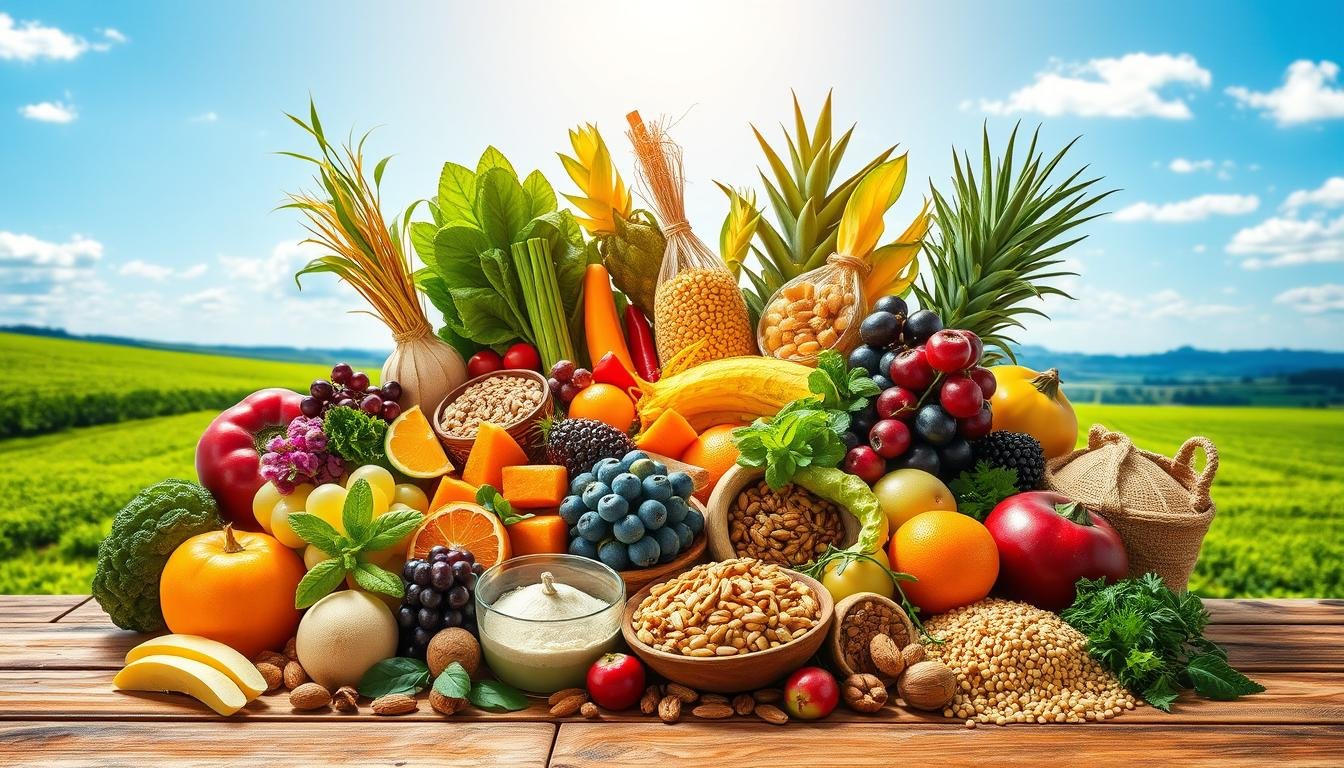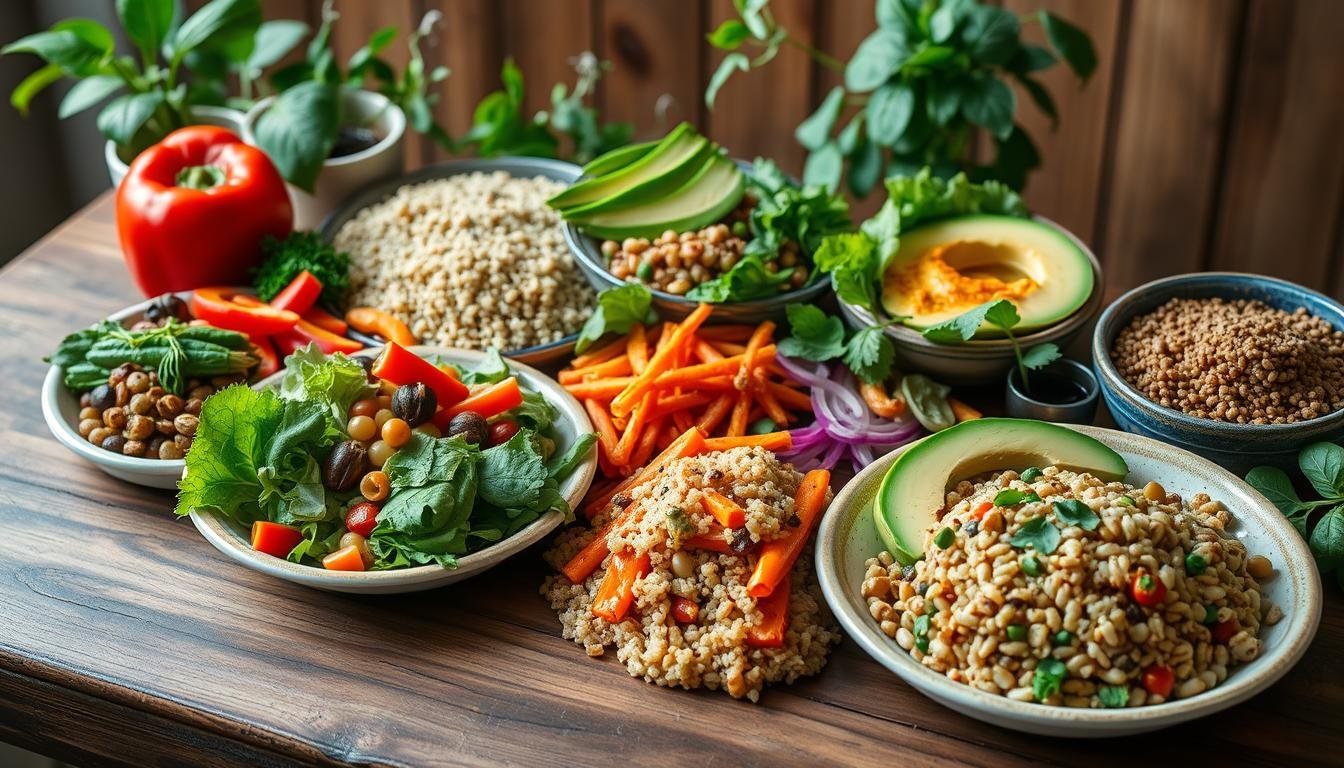The vegan food diet is gaining popularity. It offers health and environmental benefits. Vegan diets exclude animal products, benefiting both our health and the planet.
Studies show vegan diets help with weight loss and lower diabetes risk. They also improve kidney function and blood sugar levels. These diets are full of fiber, antioxidants, and vitamins, boosting overall health.
Plant-based diets are also good for the environment. Animal products, like beef, produce more greenhouse gases than plant foods. Animal agriculture is a big contributor to global emissions, even more than cars and trucks.
Choosing vegan and plant-based options helps fight climate change. In the U.S., switching to these diets could cut agricultural emissions by 73%. It could also save a lot of water, one million liters per person each year.
Key Takeaways
- Vegan diets offer numerous health benefits, including weight loss, lower risk of diabetes, and reduced cancer risk.
- Plant-based eating has a significant positive impact on environmental sustainability, reducing greenhouse gas emissions and water usage.
- Transitioning towards vegan and plant-based diets can contribute to the fight against climate change and resource depletion.
- The accessibility of vegan products in grocery stores and markets makes plant-based eating more convenient.
- Vegan diets can be tailored to individual needs, allowing for flexibility and gradual adoption.
Understanding the Fundamentals of Plant-Based Nutrition
Well-planned vegan diets can give you all the nutrients you need. You can get these from whole grains, fruits, vegetables, legumes, nuts, and seeds. It’s important to pay attention to protein, iron, calcium, vitamin B12, and omega-3 fatty acids. With the right planning, you can meet your nutritional needs and do well on a vegan diet.
Essential Nutrients in a Vegan Diet
Plant-based diets are full of vegan protein from legumes, tofu, tempeh, and nutritional yeast. Whole grains, vegetables, and fruits give you lasting energy. You can find healthy fats in avocados, nuts, seeds, and plant-based oils like olive oil.
Vegans must make sure to get enough vitamin B12 since it’s mainly in animal foods. You can find iron and calcium in many plant-based foods. For omega-3 fatty acids, try flaxseeds, chia seeds, and walnuts.
Common Nutrient Sources for Vegans
- Protein: Legumes, tofu, tempeh, seitan, nutritional yeast
- Iron: Lentils, spinach, cashews, quinoa
- Calcium: Fortified plant-based milk, tofu, kale
- Vitamin B12: Fortified products, nutritional yeast, supplements
- Omega-3s: Flaxseeds, chia seeds, walnuts
Supplementation Guidelines
Even with a balanced plant-based diet, you might need supplements for some vitamins and minerals. These include vitamin B12, vitamin D, and omega-3 fatty acids. Talking to a healthcare professional can help make sure you’re getting everything you need.
Learning about plant-based nutrition and making smart food choices is key. It helps you thrive on a vegan lifestyle. You’ll also enjoy the health and environmental benefits of a plant-based diet.
Vegan Food and Disease Prevention

Choosing a plant-based diet can greatly lower the risk of chronic diseases. Vegans might see a 75% drop in high blood pressure risk. They also face a 15% lower risk of dying from heart disease. Plus, plant-based diets can cut cancer risk by up to 15%, especially for colorectal, prostate, and breast cancers.
Vegan diets do more than just protect the heart and prevent cancer. They also lower the risk of type 2 diabetes. This is because they improve insulin sensitivity and control blood sugar levels. A vegan lifestyle might even help you live longer by reducing obesity-related diseases.
The secret to these health gains is in the whole foods at the heart of a vegan diet. These foods are packed with fiber, antioxidants, and phytochemicals. They work together to support the body and fight inflammation, a major cause of chronic diseases.
| Disease | Reduced Risk for Vegans |
|---|---|
| Heart Disease | Up to 75% lower risk of developing high blood pressure and reduced risk of mortality |
| Cancer | 15% lower risk, particularly for colorectal, prostate, and breast cancers |
| Type 2 Diabetes | Lower risk due to improved insulin sensitivity and glycemic control |
| Obesity-related Diseases | Reduced risk of developing obesity and associated chronic conditions |
By choosing a plant-based diet, you can prevent diseases and enjoy the many health benefits of a vegan lifestyle.
Weight Management and Metabolic Health Benefits

Vegan diets are great for managing weight and improving metabolic health. People on a vegan diet often lose more weight than those on other diets. This is because vegan foods are full of fiber and low in calories.
Impact on Blood Sugar Levels
A vegan diet is also good for blood sugar control and lowering type 2 diabetes risk. Plant-based foods are rich in fiber, which helps keep blood sugar stable. This can help manage conditions like prediabetes and metabolic syndrome.
Role in Weight Loss
Switching to a vegan diet can help you lose weight naturally. You don’t need to count calories because vegan foods are nutrient-rich and low in calories. Plus, avoiding high-calorie animal products helps manage weight.
Metabolic Disease Prevention
A vegan diet can lower the risk of obesity-related diseases like type 2 diabetes and heart disease. It’s because vegan diets are low in saturated fats and high in fiber and antioxidants. This leads to better metabolic health.
“The vegan diet offers additional protection against obesity, diabetes mellitus type 2, and hypertension compared to the vegetarian diet.”
Environmental Impact of Plant-Based Diets

Switching to plant-based diets can greatly help the environment. Studies show vegan diets can cut down food-related greenhouse gas emissions by up to 75%. This is because animal agriculture, especially beef, releases a lot of methane, a strong greenhouse gas.
By choosing plant-based foods, people can significantly lower their carbon footprint. This helps fight climate change.
Plant-based diets also help in other ways. They can reduce water pollution, land use, and harm to wildlife by 66% compared to diets heavy in meat. The global food system uses 70% of freshwater and causes 80% of river and lake pollution. Eating more plant-based can help tackle these issues.
As evidence grows, governments and groups are looking at ways to tackle animal agriculture’s environmental costs. They suggest things like labeling foods for their environmental impact and taxing high-carbon foods. The UK Health Alliance on Climate Change has made these proposals.
The UK government supports personal food choices but also wants to reach net-zero greenhouse gas emissions. This shows the importance of changing our diets for the planet’s sake.
Also Read : Top Healthy Food To Boost Your Everyday Nutrition
FAQs
Q: What are the health benefits of including tofu in a vegan diet?
A: Tofu is a great source of protein, providing all nine essential amino acids. It is also rich in calcium, iron, and other vital nutrients. Including tofu in your vegan food list can help in building muscle and supporting bone health.
Q: Are there many vegan options available at restaurants?
A: Yes, many restaurants now offer a variety of vegan options, including vegan burgers, tacos, and salads. It’s becoming increasingly common to find a dedicated vegan menu or plant-based options at both casual and fine dining establishments.
Q: Can you recommend a good vegan food guide for beginners?
A: A good vegan food guide will typically include a comprehensive vegan food list, highlighting essential ingredients like legumes, whole grains, fruits, vegetables, and plant-based proteins. It can also provide tips on how to go vegan effectively.
Q: What are some popular vegan dishes that I can try?
A: Some popular vegan dishes include vegan quesadillas, burritos filled with black beans, avocado, and salsa, and savory vegan tacos. You can also enjoy vegan cakes and ice cream cones made from plant-based ingredients.
Q: What types of vegan meats are available for meat substitutes?
A: There are several types of vegan meats available, including soy-based options like tofu and tempeh, jackfruit for pulled “pork” styles, and seitan made from wheat gluten. These options can be great for those who love burgers and hot dogs.
Q: Is nutritional yeast a necessary part of a vegan diet?
A: Nutritional yeast is not strictly necessary, but it’s a fantastic addition to a vegan diet. It’s rich in B vitamins, particularly B12, which can be a concern for vegans. It adds a cheesy flavor to dishes like hummus and is often used in vegan cheese recipes.
Q: How can I ensure I’m getting enough protein on a vegan diet?
A: To ensure adequate protein intake while going vegan, include a variety of plant foods such as legumes, lentils, chickpeas, tofu, edamame, and quinoa. Incorporating these into meals like vegan burgers or a hearty salad will help meet protein needs.
Q: Are there gluten-free vegan options available?
A: Yes, many gluten-free vegan options exist, such as quinoa, rice, and certain legumes. Dishes like gluten-free vegan tacos can be made using corn tortillas, and you can also find gluten-free vegan cakes and snacks at specialty stores.
Q: What is the best way to incorporate more plant-based options into my diet?
A: Start by gradually replacing meat with plant-based proteins like beans, lentils, and tofu in your meals. Explore new recipes that feature plant foods, and try to experiment with vegan versions of your favorite dishes, such as vegan mac and cheese or miso soup.
Q: How can I make vegan versions of my favorite comfort foods?
A: You can make vegan versions of comfort foods by substituting traditional ingredients with plant-based alternatives. For example, use vegan cheese for cheesy dishes, jackfruit for pulled meat, and avocado as a creamy base in recipes for savory burritos or tacos. This way, you can enjoy your favorites while staying true to vegan principles.
Source Links
- https://www.healthline.com/nutrition/vegan-diet-benefits
- https://cleanchoiceenergy.com/news/plant-based-eating-can-help-our-planet
- https://www.rush.edu/news/health-benefits-vegan-diet
- https://www.forksoverknives.com/how-tos/plant-based-primer-beginners-guide-starting-plant-based-diet/
- https://www.healthline.com/nutrition/plant-based-diet-guide
